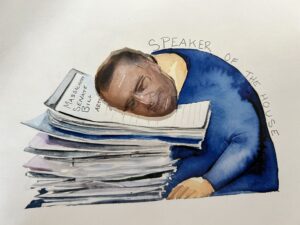PROVINCETOWN — The arts advocacy group MassCreative had a shopping list of legislation it was promoting this year, including at an event at the Fine Arts Work Center on Oct. 28. As the 2023-24 legislative session ticks into its last two weeks, however, three of those bills are still stuck in the Senate Ways and Means Committee.

One of the bills the group was promoting, the Cultural Equity in Tourism Grant, was “sent for further study” in February, which means it is effectively dead for this year.
A fifth bill, the Downtown Vitality Act, was modified and then bundled into a larger economic development bond bill that became law on Nov. 20.
The Mass. legislature is famously unproductive; this summer, nine major pieces of legislation that had passed both chambers had to be set aside when communications between the House speaker and Senate president broke down on Aug. 1.
Some of those bills were passed later during “informal sessions.”
For the arts bills, there could be a thin reed of hope. The legislature has sometimes approved legislation as late as Dec. 31, the last day of the session.
MassCreative Executive Director Emily Ruddock discussed all five bills at FAWC. The Creative Space Preservation Act would allow cities and towns to create trust funds to protect and develop creative spaces, much as they now do for affordable housing or land conservation.
The PLACE Act would require a small percentage of the budget for a new state building — typically half of one percent — to be spent on commissioning or installing public art in the building.
The ACE Act would allocate funds from the state’s health and human services budget to improve accessibility for disabled people at arts-oriented nonprofits and businesses.
Those three bills were all referred to Senate Ways and Means but were never voted on or added to a larger piece of legislation.
The Downtown Vitality Act was originally written to reallocate 5 percent of the state’s tax on online purchases into funds that support local business or cultural districts. When it was added to the economic development bond bill, the measure was rewritten into a $9.5-million grant program for downtowns and main streets, according to MassCreative.
The Cultural Equity in Tourism Grant would have allocated one percent of each year’s spending from the Mass. Tourism Trust Fund to historically marginalized communities. It was “sent for further study” by a committee, which on Beacon Hill means it’s dead for this year.
According to Fiscal Note, a legislative tracking service, Massachusetts had the least efficient state legislature in the country in 2023, with 10,508 bills introduced (third highest in the country) and only 21 bills passed (lowest in the country).
“Unfortunately, the arts are still seen by many as luxury charities,” PAAM’s Chris McCarthy said on Oct. 28. “We know that to be untrue. So much data supports how nonprofit organizations play a vital role in building healthy communities.”
“The Massachusetts creative economy adds $27 billion to the state economy each year,” said FAWC’s Sharon Polli, “and supports 135,000 jobs across the state, including many on the Outer Cape.”
Polli said that the Creative Space Preservation Act is especially exciting and follows a model set by prior efforts for land conservation and affordable housing. “As we fight to keep artists, artisans, and creative workers in our communities, this bill would give us more tools,” she said.
State Sen. Julian Cyr highlighted the Affordable Homes Act, which Gov. Maura Healey signed in August. It includes a “seasonal communities” designation that allows towns to subsidize housing specifically for artists and creative workers.
“Almost all of our creative institutions have had to get into the business of housing,” Cyr said. The seasonal-community rules are still being developed, “but it’s a big deal,” Cyr said, “and we’re going to be counting on you all to turn it into something.”
Cyr told the Independent that he “got his start” as an intern at the Fine Arts Work Center in 2006 studying these issues. “The vitality of our cultural sector remains paramount,” Cyr said. “Arts and culture are essential to the livelihoods and identity of the Cape and Islands.”
Editor’s note: Because of an editing error, an earlier version of this article, published in print on Dec. 19, referred incorrectly to Gov. Healey’s first name. It is Maura, not Jane.
